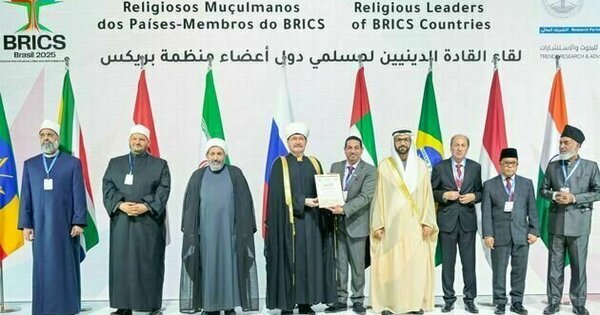The role of Muslim leaders in strengthening the BRICS coalition

TEHRAN – The convening of the “Second Meeting of Muslim Leaders of BRICS Countries” hosted by Brazil is a turning point in the life of this forum and, beyond that, a pillar in strengthening the BRICS coalition. The consultation and synergy of Muslim leaders within the BRICS framework regarding international crises is not merely desirable, but an absolute necessity.
In fact, one cannot envision the embodiment of a model of governance and collective management in today’s world without taking into account its cultural roots and dimensions. BRICS countries are fully aware and in agreement about the foundational role of culture in shaping new global relations. Therefore, the meeting of Muslim leaders from BRICS countries is not just a formal gathering for discussions on the growing crises in today’s world. We believe that this process must lead to a comprehensive model of solidarity, cooperation, and synergy—one capable of guiding even seemingly non-cultural relations within a sustainable framework. The determination of BRICS leaders in realizing this overarching model is indeed commendable.
Within this context, three essential points deserve attention:
First, in the Second Meeting of Muslim Leaders of BRICS, the Islamic Republic of Iran was widely praised—not only as a country that recently came under attack by the Zionist enemy and, in turn, dealt the harshest possible blows to that regime, but also for its consistent positions in defense of the Palestinian people. These stances played a very significant role in shaping the attention and focus of BRICS members on the principles and proposals put forward by Iran. In this setting, a comprehensive definition of the international community was first presented, followed by highlighting the inherent and existential threat posed by the Zionist regime and its supporters to humanity—illustrated with examples from the past, present, and future.
The meeting made it clear that BRICS and the Shanghai Cooperation Organization, as two dynamic and emerging blocs whose very rise in cultural, economic, and political dimensions has triggered anger and fear among the enemies of global security in Washington and Tel Aviv, must place the struggle against oppression, the defense of human rights, and the promotion of religious coexistence at the core of their strategies. Praise be to God; it became evident that outlining such inclusive strategies has become a shared concern among BRICS (and subsequently Shanghai) members. The role of the Islamic Republic of Iran as a pioneering force in confronting global oppression and hegemony is now tangible and well understood by the other members. Formulating BRICS’ strategic direction on the basis of two valuable and pragmatic components—culture and geopolitics—will both strengthen collective cooperation and contain common threats across all dimensions.
Second, cultural issues inherently involve both inputs and outputs. In today’s world, the forums and frameworks of collective cooperation such as BRICS and the Shanghai Cooperation Organization are the arenas where these cultural inputs manifest. Emerging alliances like BRICS are not only opportunities to create economic and political balance in the contemporary world, but also platforms for the development of multiculturalism and the expansion of the cultural East—not merely the geographic East. The deliberate silence—or rather, the evident outrage—of hegemonic powers over the synergy of religious and cultural leaders within BRICS is clear and telling. Culture is neither a tool nor an abstract factor; it is the main driving force behind the collective life of BRICS and Shanghai members. Culture shapes the underlying frameworks and even gives meaning and direction to both macro- and micro-level economic and political relations among members.
Third, the framework within which global relations must be defined today requires particular attention. We are at a juncture where the world needs empathy, synergy, and peaceful coexistence more than ever before. In these complex international circumstances and amid escalating regional and global tensions, addressing an issue such as interfaith coexistence is not only an ethical and humanitarian imperative but also a strategic and managerial necessity. Thus, we must begin by developing a shared and comprehensive description of what is happening in the international system, and then, based on this holistic understanding, outline and operationalize the desired state. What binds all these elements together is precisely the cultural and civilizational perspective.
The synergy of religious leaders within BRICS is a potential that must be transformed into concrete realities. We have taken strong steps along this path and will continue to do so. The outcome of such synergy around this strategic asset will be the creation of global stability and sustainability, the repulsion of common threats within the BRICS framework, and the generation of opportunities whose scope cannot be limited.
By Mohammad Mehdi Imanipour , Head of the Islamic Culture and Relations Organization
Leave a Comment